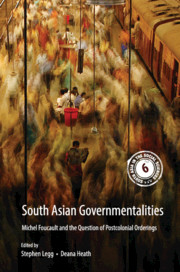11 - The Subject in Question
from Reflection
Published online by Cambridge University Press: 28 October 2018
Summary
The essays in this volume let us see what kinds of knowledge are incited by the later works of Michel Foucault and invite us, in turn, to find how those knowledges may have been implicit in earlier colonial and postcolonial self-reflection. Let me begin with subjectivation. Various branches of social sciences have at times posited a universal subject, the agent whose preferences interact with circumstances to produce behaviour. The most notorious of these universal subjects is perhaps the construct known as Rational Economic Man (Hollis and Nell, 1975). A similar strategy is evident in the ideologies justifying colonialism or legitimating the bourgeois social order. Here, we are presented with a teleology, the civilising process through which the savage evolves into the civilised subject. The savage shows itself in the form of the indigenous peoples of external lands to be conquered (Césaire, 1955 [1972]) or in the form of the dangerous classes (Chevalier, 1958 [1973]) internal to the core. Already in Les Mots et Les Choses (1966) Foucault (1971, 386) took this universal subject as his target, concluding that: ‘One thing in any case is certain: man is neither the oldest nor the most constant problem that has been posed for human knowledge’. This universal subject, then, is a historical creation. By historicising this notion, Foucault added to the scholarship that challenges the Eurocentrism of the Enlightenment project.
Of course, this challenge had multiple sources. In her chapter in this volume, Prathama Banerjee describes as ‘developmentality’ the set of interests that I have outlined as the civilising mission. Banerjee says that, as a form of governmentality, developmentality claims knowledge of the lack among the people who need developing. Being interpellated as inadequate can, particularly when reinforced by spectacular violence, produce an identification with the Master that elicits mimicry (Bhabha, 1984). Yet inadequacy and shame are uncomfortable positions and, as Srila Roy shows in her chapter with her description of the feminist Action Hero blog, they directly excite resistance.
In the eighteenth century, Jonathan Swift felt he had been consigned to the periphery when the best position offered him was as Dean of St Patrick's cathedral in Dublin.
- Type
- Chapter
- Information
- South Asian GovernmentalitiesMichel Foucault and the Question of Postcolonial Orderings, pp. 247 - 258Publisher: Cambridge University PressPrint publication year: 2018



